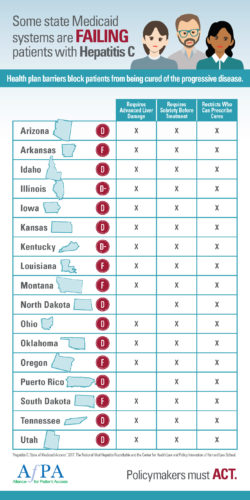
More than half of states in the U.S. are failing Medicaid patients with hepatitis C. A new report from the Harvard Law School and the National Viral Hepatitis Roundtable assigned 52 percent of states and U.S. territories a “D” or “F” for the access their Medicaid system provides to curative treatment for the disease. This comes two years after the Centers for Medicare and Medicaid Services issued a notice to states reminding them of their responsibility to provide necessary treatment to patients.
As outlined on the report’s interactive website, grades reflect three of the most restrictive criteria used to limit access to direct-acting antiviral treatments that cures the disease:
- Fibrosis: Requiring patients reach a certain stage of liver disease, which can be irreversible and cause cancer, before approving treatment.
- Sobriety: Requiring periods of abstinence from alcohol and/or substance use before being authorized to begin treatment.
- Prescriber: Limiting prescribing rights to only certain categories of specialists, who are often not readily available or geographically close to patients.
While five states received an “F” and 21 plus Puerto Rico a “D,” these results reflect a slight improvement over the 2014 grades. Access restrictions, specifically related to fibrosis, have decreased in recent years.
Historically, costs and other concerns resulted in nearly all Medicaid systems restricting access to only the sickest patients. This approach stemmed from budget concerns rather than from long-term considerations; access could not only cure the individual, but also help to eliminate hepatitis C altogether, reducing long-term costs for treating patients with advanced stage liver failure, cirrhosis and other complications.
“States with the best grades have taken steps to ensure widespread access to hepatitis C treatments, explained Robert Greenwald, MD, director of the Center for Health Law and Policy Innovation of Harvard Law School. “These states should serve as a model for those still rationing access to a hepatitis C cure….”
The issue has been a focal point for the Alliance for Patient Access’ Hepatitis Therapy Access Physicians Working Group, which submitted a letter this week to the Centers for Medicare and Medicaid Services. “Some progress has occurred […] but that progress has been sporadic and isolated,” the letter notes, adding “The health of patients with hepatitis C and the public health of the nation demand action.”
The group has issued a web video, a policy paper and several educational infographics on the topic.

